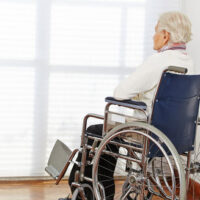Five Kinds of Nursing Home Abuse

According to some estimates, about half of nursing home patients experience some form of abuse. Yet the vast majority of these instances are unreported. Many times, the victims fear reprisals from their abusers. Other times, the victims are not fully aware of the abuse that surrounds them.
Typically, the nursing home is legally responsible for damages in these cases. Common theories include negligent hiring and negligent supervision. Negligent hiring usually involves the knowing employment of an incompetent person or a failure to ask the right questions during the interview. Negligent supervision usually involves a failure to identify wrongful conduct on the job and/or a failure to take corrective action.
Staff on Resident Abuse
Many nursing home residents are physically frail. A tiny amount of force is sufficient to cause serious injuries, like deep bruises or broken bones. Moreover, many elderly victims heal very slowly once they are injured. And, they must usually relocate to another facility. As a result, the economic losses can be substantial. A personal injury attorney can obtain compensation for all these losses. Furthermore, attorneys are also experienced negotiators. So, they can usually lower provider fees. That means victims pocket more of their settlement money.
Financial Abuse
As mentioned, many older people are easily swayed or cajoled. So, this umbrella term covers a wide range of activities, including:
- Forced signatures on financial documents,
- Outright theft, and
- Elaborate financial schemes.
Financial abuse is normally associated with private caregivers, although financial abuse can occur in nursing home settings as well. In either place, the above described legal theories apply.
Sexual Abuse
Many nursing homes are quite crowded and patients have little privacy. So, sexual abuse is all too frequent. Some common instances include:
- Forcing sexual contact,
- Compelling residents to watch pornography,
- Making sexual remarks, and
- Forcing residents to witness sex acts.
Sexual abuse often leaves both physical and emotional evidence. If your loved one has torn clothes or unusual injuries, they could be evidence of sexual abuse. The same could be true if your loved one behaves strangely or is afraid of certain caregivers.
Emotional Abuse
That old “sticks and stones” line is clearly not true. Emotional abuse hurts just as much as physical abuse. Some caregivers say hurtful things, like “no one wants you.” Other caregivers place residents in isolation because there is a lack of supervision or as a form of punishment. Emotional wounds cause significant noneconomic losses, like emotional distress and loss of enjoyment in life. Compensation may be available for these damages as well.
Resident on Resident Abuse
This problem is one of the fastest-growing ones in the nursing home abuse area. Typically, the problem begins with a small disagreement. That could be a conflict over a preferred sofa in the common area or an aimless wandering into another person’s room. If staff members do not quickly diffuse these conflicts, they often end violently. Since many residents have pre-existing medical conditions, the resulting injuries could be quite serious. Usually, full compensation is available in these cases.
Contact Aggressive Lawyers
If your loved one is in a nursing home, your loved one has probably been abused. For a free confidential consultation with an experienced nursing home attorney in Tampa, contact The Matassini Law Firm, P.A. We do not charge upfront legal fees in negligence cases.
